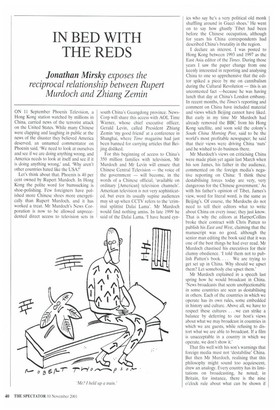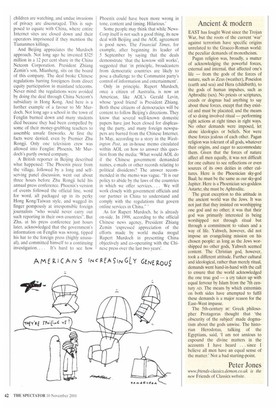IN BED WITH THE REDS
Jonathan Mirsky exposes the
reciprocal relationship between Rupert Murdoch and Zhiang Zemin
ON 11 September Phoenix Television, a Hong Kong station watched by millions in China, carried news of the terrorist attack on the United States. While many Chinese were clapping and laughing in public at the news of the disaster they believed America deserved, an unnamed commentator on Phoenix said, 'We need to look at ourselves and see if we are doing anything wrong, and America needs to look at itself and see if it is doing anything wrong,' and, 'Why aren't other countries hated like the USA?'
Let's think about that. Phoenix is 40 per cent owned by Rupert Murdoch. In Hong Kong the polite word for bumsucking is shoe-polishing. Few foreigners have polished more Chinese shoes more energetically than Rupert Murdoch, and it has worked a treat. Mr Murdoch's News Corporation is now to be allowed unprecedented direct access to television sets in south China's Guangdong province. NewsCorp will share this access with AOL Time Warner, whose chief executive officer, Gerald Levin, called President Zhiang Zemin 'my good friend' at a conference in Shanghai, where Time magazine had just been banned for carrying articles that Beijing disliked.
For this beginning of access to China's 350 million families with television, Mr Murdoch and Mr Levin will ensure that Chinese Central Television — the voice of the government — will become, in the words of a Chinese official, 'available on ordinary [American] television channels'. American television is not very sophisticated, but even its usually supine audiences may sit up when CCTV refers to the 'criminal splittist Dalai Lama'. Mr Murdoch would find nothing amiss. In late 1999 he said of the Dalai Lama, 'I have heard cyn ics who say he's a very political old monk shuffling around in Gucci shoes.' He went on to say how ghastly Tibet had been before the Chinese occupation, although for years his China correspondents had described China's brutality in the region.
I declare an interest. I was posted to Hong Kong between 1993 and 1997 as the East Asia editor of the Times. During those years I saw the paper change from one keenly interested in reporting and analysing China to one so apprehensive that the editor spiked a piece by me on cannibalism during the Cultural Revolution — this is an uncontested fact —because he was having lunch that day at China's London embassy. In recent months, the Times's reporting and comment on China have included material and views which Beijing cannot have liked. But early in my time Mr Murdoch had already removed the BBC from his Hong Kong satellite, and soon sold the colony's South China Morning Post, said to be the world's most profitable newspaper; he said that their views were driving China 'nuts' and he wished to do business there.
Mr Murdoch's views on criticising China were made plain yet again last March when his son James, his father in the audience, commented on the foreign media's negative reporting on China: 'I think these destabilising forces today are very, very dangerous for the Chinese government.' As with his father's opinion of Tibet, James's view, word for literal word, is the same as Beijing's. Of course, the Murdochs do not need to tell their editors what to write about China on every issue; they just know. That is why the editors at HarperCollins broke their contract with Chris Patten to publish his East and West, claiming that the manuscript was no good, although the senior man editing the book said that it was one of the best things he had ever read. Mr Murdoch chastised his executives for their clumsy obedience. told them not to pub lish Patten's book... We are trying to get set up in China. Why should we upset them? Let somebody else upset them.'
Mr Murdoch explained in a speech last spring how he would broadcast in China. 'News broadcasts that seem unobjectionable in some countries are seen as destabilising in others. Each of the countries in which we operate has its own rules, some embedded in history and culture. Above all, we have to respect these cultures . .. we can strike a balance by deferring to our host's views about what we may broadcast in countries in which we are guests, while refusing to distort what we are able to broadcast. If a film is unacceptable in a country in which we operate, we don't show it.'
That fits well with his son's warnings that foreign media must not 'destabilise' China. But then Mr Murdoch, realising that this philosophy might sound too acquiescent, drew an analogy. Every country has its limitations on broadcasting, he noted; in Britain, for instance, there is the nine o'clock rule about what can be shown if children are watching, and undue invasions of privacy are discouraged. This is supposed to equate with China, where entire Internet sites are closed down and their operators imprisoned if they mention the Tiananmen And Beijing appreciates the Murdoch approach. Not long ago he invested $325 million in a 12 per cent share in the China Netcom Corporation. President Zhiang Zemin's son, Mianheng, sits on the board of this company. The deal broke Chinese regulations barring foreigners from direct equity participation in mainland telecoms. Never mind: the regulations were avoided by doing the deal through China Netcom's subsidiary in Hong Kong. And here is a further example of a favour to Mr Murdoch. Not long ago a school in the town of Penglin burned down and many students died because they had been compelled by some of their money-grubbing teachers to assemble unsafe fireworks. At first the facts were denied, even by Premier Zhu Rongji. Only one television crew was allowed into Penglin: Phoenix, Mr Murdoch's partly owned company.
A British reporter in Beijing described what happened: The Phoenix piece from the village, followed by a long and selfserving panel discussion, went out about three hours before Zhu Rongji held his annual press conference. Phoenix's version of events followed the official line, word for word, all packaged up in its perky Hong Kong/Taiwan style, and wagged its finger pompously at irresponsible foreign journalists "who would never carry out such reporting in their own countries-. But Zhu, at his press conference just hours later, acknowledged that the government's information on Penglin was wrong, tipped his hat to the foreign press (highly unusual), and committed himself to a continuing
investigation. . . . It's hard to see how Phoenix could have been more wrong in tone, content and timing. Hilarious.'
Some people may think that while NewsCorp itself is not such a good thing, its new deal with Beijing and the AOL agreement is good news. The Financial Times, for example, after beginning its leader of 5 September by saying that the deals demonstrate 'that the kowtow still works', suggested that 'in principle, broadcasters from democratic countries are likely to pose a challenge to the Communist party's control of information and entertainment'.
Only in principle. Rupert Murdoch, once a citizen of Australia, is now an American, like AOL's Gerald Levin, whose 'good friend' is President Zhiang. Both these citizens of democracies will be content to follow Beijing's directions. They know that several well-known domestic papers have just been closed for displeasing the party, and many foreign newspapers are barred from the Chinese Internet. In May, according to a story in the Washington Post, an in-house memo circulated within AOL on how to answer this question from the media: 'What would AOL do if the Chinese government demanded names, e-mails or other records relating to political dissidents? The answer recommended in the memo was vague. "It is our policy to abide by the laws of the countries
in which we offer services. . . We will work closely with government officials and our partner in China to understand and comply with the regulations that govern online services in China." ' As for Rupert Murdoch, he is already on-side. In 1998, according to the official Chinese news agency, President Zhiang Zemin 'expressed appreciation of the efforts made by world media mogul Rupert Murdoch in presenting China objectively and co-operating with the Chinese press over the last two years'.















































































































 Previous page
Previous page